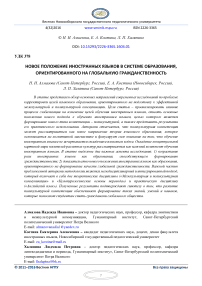The new position of foreign language as education for global citizenship
Автор: Almazova Nadezhda Ivanovna, Kostina Ekaterina Alekseevna, Khalyapina Liudmila Petrovna
Журнал: Science for Education Today @sciforedu
Рубрика: Педагогические и психологические науки
Статья в выпуске: 4 (32), 2016 года.
Бесплатный доступ
The article presents the observation of modern directions in research devoted to the problem of changes of the goals in language education, oriented on preparation for effective intercultural and multicultural communication. The purpose of this article is to analyze the influence of the process of globalization on the goals of teaching foreign languages, to describe the ideas of a new approach to the system of foreign language teaching aimed at developing a new type of competence - multicultural and to present its practical results. The authors point out that multicultural competence is characterized here as a new perspective in the theory of linguistic education which is based on cognitive linguistics and focused on the fact that teaching foreign languages is not only a language code acquisition. An important component of teaching is a conceptual world picture of native speakers belonging to different cultures. Two aspects are underlined in the article: 1) the growth of the role of foreign language teaching as education for citizenship [4], 2) confirmation of the new position of foreign language teaching as education for global citizenship. The most important part of the authors’ methodology is an interdisciplinary and integrating approach which includes the theoretical course “Intercultural and multicultural communication” + the theoretical course “Cultural aspects of interpretation” + the practical course “Foreign language (English)”. The results proved the idea that the development of multicultural competence provides the formation of necessary knowledge and skills helping students to become global citizens.
Globalization, multicultural competence, intercultural/multicultural communication, interdisciplinary approach, foreign culture, cultural concepts, global citizen, global citizenship
Короткий адрес: https://sciup.org/147137747
IDR: 147137747 | DOI: 10.15293/2226-3365.1604.01
Список литературы The new position of foreign language as education for global citizenship
- Aguilar M. J. Intercultural Communicative Competence as a Tool for Autonomous Learning//Revista Canaria de Estudios Ingleses. -2010. -№ 61. -P. 87-98.
- Alred G., Byram M. Becoming an intercultural mediator: a longitudinal study of residence abroad//Journal of multilingual and multicultural development. -2002. -Vol. 23 (5). -P. 339-352 DOI: 10.1080/01434630208666473
- Archer M. S. Sociology for One World: Unity and Diversity//International Sociology. -1991. -Vol. 6. -P. 131 DOI: 10.1177/026858091006002001
- Bennet M. J. Towards Ethnorelativism: A Developmental Model of Intercultural Sensitivity//Education for the Intercultural Experience/Ed. R. M. Paige. -U.S.A.: Intercultural Press, 1993. -P. 21-71.
- Byram M. From Foreign Language Education to Education for Intercultural Citizenship. Essays and reflections. -Clevedon: Multilingual Matters, 2008. -P. 288.
- Byram M. On being “bicultural” and “intercultural” in Intercultural Experience and Education/Eds. G. Alred, M. Byram and M. P. Fleming. -Clevedon: Multilingual Matters, 2002. -P. 50-66.
- Byram M. Teaching and Assessing Intercultural Communicative Competence. Clevedon: Multilingual Matters, 1997. -P. 7.
- Byram M. Language Awareness and (critical) cultural awareness -relationships, comparisons and contrasts//Language Awareness. -2012. -№ 21 (1-2). -P. 5-13. DOI: http://dx.doi.org/10.1080/09658416.2011.639887
- Georgiou M. Intercultural competence in foreign language teaching and learning: action inquiry in a Cypriot tertiary institution. -URL: http://eprints.nottingham.ac.uk/11866/1/Intercultural_ competence_in_FLL.pdf (accessed 30.07.2016).
- Giddens A. Modernity and Self-Identity: Self and Society in the Late Modern Age. -Stanford California: Stanford University Press, 1991. -P. 64.
- Nugent K., Catalano T. Critical cultural awareness in the foreign language classroom//NECTFL Review. -2015. -№ 75. -P. 15-30 DOI: 10.1080/17405904.2013.813774
- Robertson R. Globalization: Social Theory and Global Culture. -UK: SAGE Publications, 1992. -P. 8.
- Rubenfield S. Intercultural Mediation: Social, Linguistic and Psychometric Consideration. -Ottava, Canada: Canada’s University, 2009. -P. 15.
- Пахмутова Е. Телекоммуникационные проекты в межкультурном обучении иностранным языкам. -Саранск: Мордовский гос. университет, 2003. -С. 56.
- Portera A. Intercultural education in Europe: epistemological and semantic aspects//Intercultural education. -2008. -Vol. 19, № 6. -P. 481-491. DOI: http://dx.doi.org/10.1080/14675980802568277
- Stier J. Internationalisation, Ethnic Diversity and the Acquisition of Intercultural Competencies//Intercultural Education. -2003, Vol. 14, Issue 1. -P. 77-95. DOI: http://dx.doi.org/10.1080/1467598032000044674
- Stier J. Intercultural Competencies as a Means to Manage Interactions in Social work//Journal of Intercultural Communication. -2004. -Issue 7. -P. 1-17.
- Stiftung B., Cariplo F. Intercultural competence -The key competence in the 21st century? -Germany: Bertelsmann Stiftung, 2008. -P. 4.


